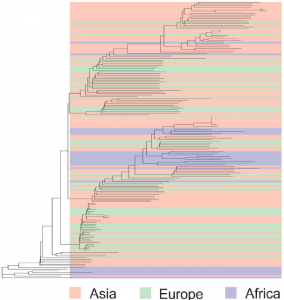Taking the conversation to the classroom
BIO150: Evolutionary Foundations of Biodiversity
Students in BIO150 learn about the forces leading to genetic divergence among human lineages and are able to explore these factors with respect to data on historically recognized human races. While significant genetic genetic differences are associated with ancestry, they do not align well with race or geography. These analyses reveal that racial delineation is primarily a social, and not biological construct.

bio124: Biology of women
There are many historical examples of black females, indigenous females, females of color and females with disabilities that have contributed to the advancement of biological research. For too long these females have not received the credit due to them. Unfortunately, there has also been a lack of exposure on the exploitation of these groups of females within scientific research and experimentation. With the aim to celebrate these individuals and their scientific contributions as well as expose the injustices that these individuals faced, we will be researching specific cases and writing up a description of these contributions and exploitations with the goal that these descriptions could be used as web content to bring these stories to a larger audience.
bio386: animal behavior
Students in BIO386 learn about the underlying causes of animal behavior. These explanations of animal behavior are shaped by Niko Tinbergen’s four questions: 1) What are the causal mechanisms? 2) How does the behavior develop? 3) What is the evolutionary history of the behavior? and 4) What is that adaptive function of the behavior? As part of this course, students also learn about the significant contributions of BIPOC scientists to the field of Animal Behavior. For example, Dr. Charles Henry Turner was a pioneer in understanding animal cognition. He the first to document color vision in bees, pitch detection in insects, and that cockroaches can learn by trial and error. He was also the first Black scientist to publish in the prestigious journal Science, and throughout his research career, he continued to publish in this journal two more times. Despite his success in research Dr. Turner faced many challenges in the academy, and some suggest that these challenges prevented him from holding a permanent faculty position in higher education.
You must be logged in to post a comment.